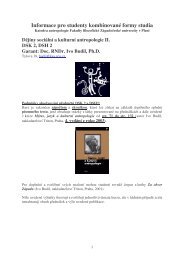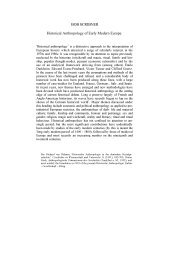The Revival of Narrative: Reflections on a New Old History ...
The Revival of Narrative: Reflections on a New Old History ...
The Revival of Narrative: Reflections on a New Old History ...
Create successful ePaper yourself
Turn your PDF publications into a flip-book with our unique Google optimized e-Paper software.
THE REVIVAL OF NARRATIVE '3many valuable new findings and a few major c<strong>on</strong>tributi<strong>on</strong>s to therelatively small corpus <str<strong>on</strong>g>of</str<strong>on</strong>g> historical works <str<strong>on</strong>g>of</str<strong>on</strong>g> permanent value. But ingeneral the sophisticati<strong>on</strong> <str<strong>on</strong>g>of</str<strong>on</strong>g> the methodology has tended to exceed thereliability <str<strong>on</strong>g>of</str<strong>on</strong>g> the data, while the usefulness <str<strong>on</strong>g>of</str<strong>on</strong>g> the results seems -up toa point -to be in inverse correlati<strong>on</strong> to the mathematical complexity<str<strong>on</strong>g>of</str<strong>on</strong>g> the methodology and the grandiose scale <str<strong>on</strong>g>of</str<strong>on</strong>g> data-collecti<strong>on</strong>.On any cost-benefit analysis the rewards <str<strong>on</strong>g>of</str<strong>on</strong>g> large-scale computerizedhistory have so far <strong>on</strong>ly occasi<strong>on</strong>ally justified the input <str<strong>on</strong>g>of</str<strong>on</strong>g> timeand m<strong>on</strong>ey and this has led historians to cast around for other methods<str<strong>on</strong>g>of</str<strong>on</strong>g> investigating the past, which will shed more light with less trouble.In 1968 Le Roy Ladurie prophesied that by the 1980s "the historianwill be a programmer or he will be nothing".13 <str<strong>on</strong>g>The</str<strong>on</strong>g> prophecy has notbeen fulfilled, least <str<strong>on</strong>g>of</str<strong>on</strong>g> all by the prophet himself.Historians are therefore forced back up<strong>on</strong> the principle <str<strong>on</strong>g>of</str<strong>on</strong>g> indeterminacy,a recogniti<strong>on</strong> that the variables are so numerous that at best<strong>on</strong>ly middle-range generalizati<strong>on</strong>s are possible in history, as RobertMert<strong>on</strong> l<strong>on</strong>g ago suggested. <str<strong>on</strong>g>The</str<strong>on</strong>g> macro-ec<strong>on</strong>omic model is a pipedream,and "scientific history" a myth. M<strong>on</strong>ocausal, explanati<strong>on</strong>ssimply do not work. <str<strong>on</strong>g>The</str<strong>on</strong>g> use <str<strong>on</strong>g>of</str<strong>on</strong>g> feed-back models <str<strong>on</strong>g>of</str<strong>on</strong>g> explanati<strong>on</strong> builtaround Weberian "elective affinities" seems to provide better tools forrevealing something <str<strong>on</strong>g>of</str<strong>on</strong>g> the elusive truth about historical causati<strong>on</strong>,especially if we aband<strong>on</strong> any claim that this methodology is in anysense scientific.Disillusi<strong>on</strong>ment with ec<strong>on</strong>omic or demographic m<strong>on</strong>ocausal determinismand with quantificati<strong>on</strong> has led historians to start asking aquite new set <str<strong>on</strong>g>of</str<strong>on</strong>g> questi<strong>on</strong>s, many <str<strong>on</strong>g>of</str<strong>on</strong>g> which were previously blockedfrom view by the preoccupati<strong>on</strong> with a specific methodology, structural,collective and statistical. More and more <str<strong>on</strong>g>of</str<strong>on</strong>g> the "new historians"are now trying to discover what was going <strong>on</strong> inside people'sheads in the past, and what it was like to live in the past, questi<strong>on</strong>swhich inevitably lead back to the use <str<strong>on</strong>g>of</str<strong>on</strong>g> narrative.A significant sub-group <str<strong>on</strong>g>of</str<strong>on</strong>g> the great French school <str<strong>on</strong>g>of</str<strong>on</strong>g> historians, ledby Lucien Febvre, has always regarded intellectual, psychological andcultural changes as independent variables <str<strong>on</strong>g>of</str<strong>on</strong>g> central importance. Butfor a l<strong>on</strong>g time they were in a minority, left behind in a remote backwateras the flood-tide <str<strong>on</strong>g>of</str<strong>on</strong>g> "scientific history", ec<strong>on</strong>omic and social inc<strong>on</strong>tent, structural in organizati<strong>on</strong> and quantitative in methodology,swept past them. Now, however, the topics they were interested inhave quite suddenly become fashi<strong>on</strong>able. <str<strong>on</strong>g>The</str<strong>on</strong>g> questi<strong>on</strong>s asked, however,are not quite the same as they used to be, since they are now <str<strong>on</strong>g>of</str<strong>on</strong>g>tendrawn from anthropology. In practice, if not in theory, anthropologyhas tended to be <strong>on</strong>e <str<strong>on</strong>g>of</str<strong>on</strong>g> the most ahistorical <str<strong>on</strong>g>of</str<strong>on</strong>g> disciplines in its lack <str<strong>on</strong>g>of</str<strong>on</strong>g>interest in change over time. N<strong>on</strong>e the less it has taught us how a wholesocial system and set <str<strong>on</strong>g>of</str<strong>on</strong>g> values can be brilliantly illuminated by the'3 Le Roy Ladurie, Le territoire de I'historien, i, p. 14 (my translati<strong>on</strong>).







